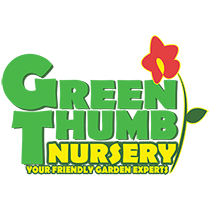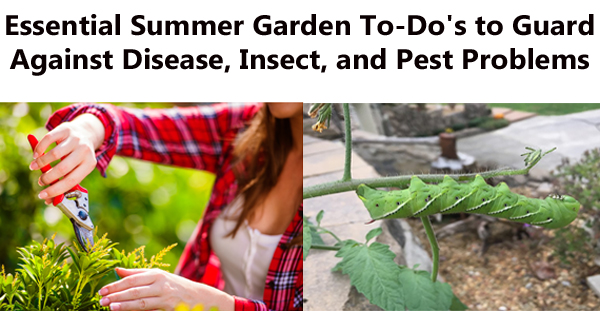Newsletter Articles
Essential Summer Garden To-Do’s to Guard Against Disease, Insect, and Pest Problems
Written by Susan B.
Throughout the summer, we get to enjoy everything our yards and gardens offer us. Regardless of your experience, keeping up with everything you need to do, and should do to keep your flowering plants healthy and blooming prolifically, and making sure that your vegetable plants are producing can be overwhelming. And this is especially true if you have a house full of family members who demand your attention throughout the day. Think of this list as a checklist to help you keep up with summer gardening chores and a list of things to look for, so you know how to deal with insect and pest infestations or diseases before they destroy your plants.
Deadheading Spent Flowers and Pinching Back Plants
Deadheading is the technical term that refers to the practice of removing spent or dead flowers after they bloom. Doing so will keep your flowers looking neater. But the more important reason for doing this is to prevent the plant from putting energy into producing seeds – which is what flowering plants do if the shriveled and dried up flowers aren’t removed. Pinching the dead flowers away encourages your plant to produce more flowers – which is what you want it to do.
Pinching is what you do when you want to keep your plants from growing tall and skinny. You do this with flowering plants like Chrysanthemums, so you have bushy plants that are covered with blooms in the fall. You also do it with your herbs to prevent them from flowering. Pinching them also encourages herbs to grow wider. With some herbs like mint and chives, preventing them from flowering or producing seeds is the best way to contain them. If you forget to do this, the plants they’ll reseed and your chives and mint will grow uncontrollably like an invasive weed.
Maintain a 2-Inch Layer of Mulch
A two-inch layer of mulch around your vegetable plants and flowers covers the ground with a protective blanket. It acts as a sun shield, but it also keeps the ground below it cooler, and plant roots are happier when the underground temperature is consistent. The mulch will also minimize evaporation after you water, and that causes the soil to dry out faster. Use organic mulch products because they provide your soil with long-term benefits.
Control Weeds So They Don’t Control You or Your Garden
Mulch does minimize weed growth, but it can’t eliminate it entirely. Summer weather contributes to the proliferation of weeds. Their presence will rob your plants of valuable soil nutrients and water.
Weeds also provide destructive insects and pests with nesting and hiding places. And weeds often provide a breeding ground for the development of diseases.
Dig up weeds before they get so large that you can’t pull them up with your hands or a hand weeder. The best time to weed your garden is after a rain when the ground is still moist, but not soaking wet.
Inspect Your Plants Regularly for Evidence of Insect or Pest Damage, or Diseases
Some plant problems are beyond our control. If we have too much rain, plants are likely to be stressed from overwatering. That makes them more susceptible to attack from bugs or pests.
Aphids
Aphids are a common pest problem. There are many species, and they attack many plants. And when they do, they attack in groups. They eat the non-visible parts of leaves, sucking the plant juices out of them. Their damage often results in leaf curling or other distortion. And one of the ways they inflict damage is through the production of sooty mold or honeydew.
Aphids don’t typically cause long-term problems on plants. They are tiny bugs that are shaped like pears. Some species have wings, others don’t. Aphid species vary in color, and they can be black, brown, gray, green, red, or yellow. Host plants that appeal to aphids include cabbage, kale, lettuce, and tomatoes.
To prevent aphids, add lots of flowering plants that have small blooms to your garden. They will attract beneficial insects that deter aphids.
You can physically control aphids by spraying the plant leaves and tissues with a garden hose. That may dislodge them from the plant. You can also squish them with your hands. To prevent aphids from attacking vegetable plants, cover them with a floating row cover.
Organic products that will help you deal with hard to control attacks include insecticidal soap, and Neem-oil based insecticides.
Tomato/Tobacco Hornworms (Manduca quinque maculata; Manduca sexta)
Adult hornworms are nocturnal, giant moths. They have brownish/gray wings. Hornworm caterpillars are green. They get their name from the horn that sticks out of the back of their bodies. They either have white stripes or V’s that run along the side of their bodies.
Affected plants are all members of the tomato family, including eggplants, peppers, potatoes, and tomatoes. They cause damage when they leave their excrement on the leaves. The most significant harm involves eating leaves, starting at the top of the plant. They eat plants and cause damage at night. During the day, they hide among the leaves.
The best way to prevent hornworm attacks is with plants that produce tiny flowers. Place them near plants that are at risk for attack. These plants attract parasitic wasps. The wasp cocoons sit on the backs of hornworms and eat them from the inside out as they hatch.
The best way to control hornworms – if you can is to pick them off the plants – unless they have the white parasitic wasp cocoon on their backs. An organic control product – should the need arise, is B.T. – or Bacillus Thuringiensis.
Whiteflies
Whiteflies are tiny white flies that look like miniature moths. They congregate under plant leaves in groups, leaving a sticky honeydew substance on the leaves.
Whiteflies attack citrus, peppers, sweet potatoes, and tomatoes. Adults and nymphs suck the juice from plant tissues. The leaves turn yellow, then wilt. When the attacks are severe, the leaves fall off altogether, weakening plants.
The best method for physical control is placing the yellow sticky cards that attract flies near the plants. These cards will catch adult whiteflies and prevent them from laying eggs. Organic control products include insecticidal soap, Neem oil, and hot pepper wax.
If you suspect you have a diseased plant, or damage from insects or pests, but don’t know how to deal with it, don’t hesitate to call us or come into one of our stores to enlist the help of our garden experts. We’re here for you, and we believe that helping our customers find solutions to their garden problems is one of the ways through which we can use our expertise to the benefit of our communities.
Do you like what you see? Sign up for our weekly newsletter to get content like this every week!

